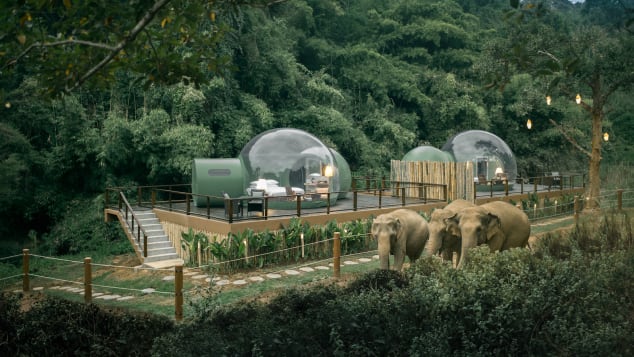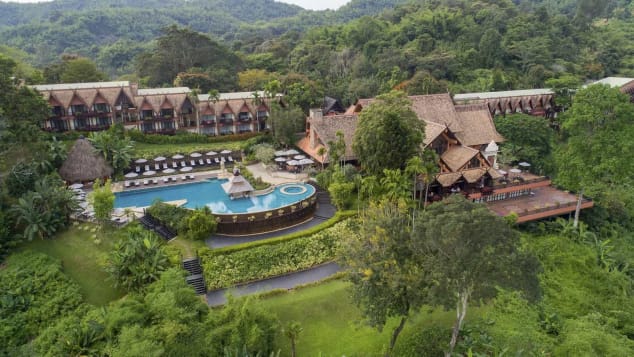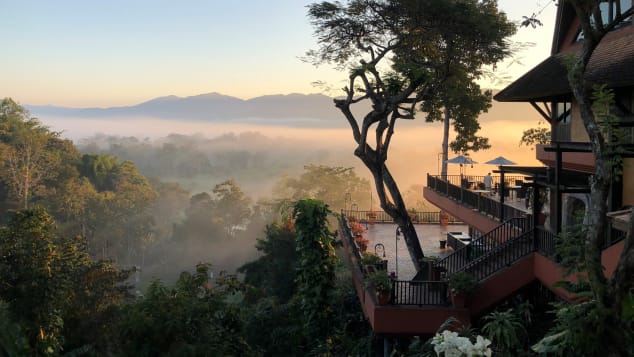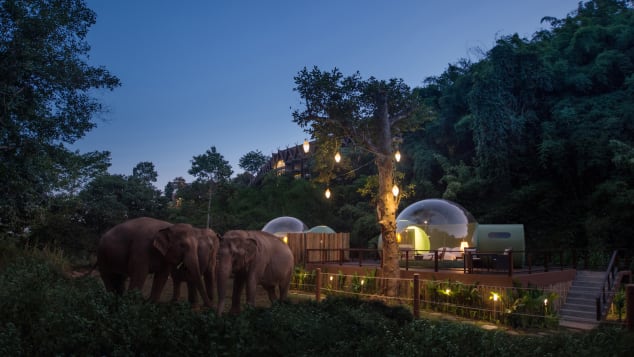
Elephants don’t sleep much. They eat loudly. They pass gas loudly, too.These are just some of the insights you’ll walk away with after spending the night in one of the Anantara Golden Triangle Elephant Camp & Resort’s fabulous new “Jungle Bubbles” in Chiang Rai, Thailand.The two transparent domes sit next to a large enclosure inhabited by three rescued elephants, which are cared for by the resort’s Golden Triangle Asian Elephant Foundation.
Guests can sit back and watch as these female elephants play with the strategically placed “toys” that hang from large trees, their powerful trunks occasionally ripping off huge chunks of bark and branches, sending loud cracks through the evening air.But really, they mainly just want to eat.Thankfully, a hefty supply of sugar cane is placed within eyesight of the bubbles, meaning the elephants are almost always just a few steps away.
The bubbles are booked as an “experience” in addition to your reserved resort room, for 17,700 baht (US$563) per night per couple. This means you can just pack an overnight bag and leave the rest of your belongings in your suite.Guests are picked up from the lobby just before sunset, then driven down a dirt road in an open-air jeep before taking a short walk through the resort’s rice paddy to get to the bubbles.Shortly after arrival, staff deliver an evening picnic basket, filled with pre-selected sandwiches and other cold dishes, allowing you to eat alongside the animals.

There’s a strict “no hands” policy when it comes to the elephants though — bubble guests are not allowed to touch or feed them.So how comfortable are the bubbles?Each air-conditioned, pressurized 22-square-meter space is a mini slice of luxury, furnished with a comfortable king-sized bed. There’s a small washroom with a toilet and shower, along with a couple of chairs and a small table near the bed. No TVs here — the elephants are the star of this show.
Sensitive sleepers will find It particularly surreal. As night passed during a recent visit, the moon made its way over the bubble, offering various levels of illumination. (Eye masks are provided as it can be surprisingly bright.)Given these ladies don’t nod off much — elephants in captivity sleep only 4-6 hours a day — you’ll hear all sorts of delightful sounds throughout the night and might find yourself crawling out of bed for a late-night peek.The bed features wrap-around curtains, offering privacy for those who worry they won’t wake up before the caretakers arrive with the elephants’ breakfast.

Anantara’s nonprofit Golden Triangle Asian Elephant Foundation (GTAEF), founded in 2006 and overseen by Roberts, cares for about two dozen elephants.Most of the animals have led hard lives — some spent their days walking the streets of Bangkok with their owners, making money begging from tourists. Others came from tourist trekking camps.The way the program works is the foundation invites mahouts (elephant trainers/owners) and their families to move to Chiang Rai with their elephants and live in the foundation’s camp.The foundation offers them a wage, which includes the cost of care for their elephants.
This amounts to about $18,000 per elephant per year.Roberts acknowledges that in a perfect world all elephants would be roaming free in the wild but the situation is incredibly complex.”Unfortunately, you can’t release elephants in Thailand,” he says, rattling off a long list of complications including fears of disease transmission, potential conflict in a fragile wild herd and an inability for domesticated elephants to fend for themselves given they’ve spent most if not all of their lives in captivity. And then there are Thailand’s laws, which would also need to be changed.

Thailand’s domesticated elephants are all registered under the Draft Animals Act, so “if you put a captive elephant in a national park you’re officially illegally grazing your livestock and that’s the law as it is,” says Roberts.As an alternative, the GTAEF aims to improve the welfare of captive elephants through various programs not just at its resort but throughout the region — including mahout training — while also taking part in conservation and wild elephant programs.
